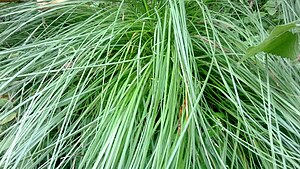Note: This is a project under development. The articles on this wiki are just being initiated and broadly incomplete. You can Help creating new pages.
Difference between revisions of "Eulaliopsis binata"
| (2 intermediate revisions by the same user not shown) | |||
| Line 1: | Line 1: | ||
[[File:Eulaliopsis binata 02.jpg|thumb|right]] | [[File:Eulaliopsis binata 02.jpg|thumb|right]] | ||
| + | '''Eulaliopsis binata''' is a perennial, clump-forming grass with leaf-blades 30 - 80cm tall and flowering stems 60 - 90cm tall. In India, this species is the second-most important raw material for paper pulp after bamboos, and it is much collected from the wild there. | ||
==Uses== | ==Uses== | ||
{{Uses|}}, {{Uses|}}, {{Uses|}}, {{Uses|}}, {{Uses|}}, {{Uses|}}, {{Uses|}}, {{Uses|}}, {{Uses|}}, {{Uses|}}, {{Uses|}}.<ref name="Uses"/> | {{Uses|}}, {{Uses|}}, {{Uses|}}, {{Uses|}}, {{Uses|}}, {{Uses|}}, {{Uses|}}, {{Uses|}}, {{Uses|}}, {{Uses|}}, {{Uses|}}.<ref name="Uses"/> | ||
==Parts Used== | ==Parts Used== | ||
| − | {{Parts Used| | + | {{Parts Used|}}. |
==Chemical Composition== | ==Chemical Composition== | ||
| Line 28: | Line 29: | ||
==Habit== | ==Habit== | ||
| − | {{Habit|}} | + | {{Habit|Perennial}} |
==Identification== | ==Identification== | ||
| Line 47: | Line 48: | ||
==Mode of Propagation== | ==Mode of Propagation== | ||
| − | {{Propagation|}} | + | {{Propagation|Seeds}} |
==How to plant/cultivate== | ==How to plant/cultivate== | ||
| Line 53: | Line 54: | ||
==Commonly seen growing in areas== | ==Commonly seen growing in areas== | ||
| − | {{Commonly seen| | + | {{Commonly seen|Dry mountain slopes}}. |
==Photo Gallery== | ==Photo Gallery== | ||
Latest revision as of 12:03, 5 May 2020
Eulaliopsis binata is a perennial, clump-forming grass with leaf-blades 30 - 80cm tall and flowering stems 60 - 90cm tall. In India, this species is the second-most important raw material for paper pulp after bamboos, and it is much collected from the wild there.
Contents
- 1 Uses
- 2 Parts Used
- 3 Chemical Composition
- 4 Common names
- 5 Properties
- 6 Habit
- 7 Identification
- 8 List of Ayurvedic medicine in which the herb is used
- 9 Where to get the saplings
- 10 Mode of Propagation
- 11 How to plant/cultivate
- 12 Commonly seen growing in areas
- 13 Photo Gallery
- 14 References
- 15 External Links
Uses
[[:Category:Ayurvedic Herbs known to be helpful to treat |]], [[:Category:Ayurvedic Herbs known to be helpful to treat |]], [[:Category:Ayurvedic Herbs known to be helpful to treat |]], [[:Category:Ayurvedic Herbs known to be helpful to treat |]], [[:Category:Ayurvedic Herbs known to be helpful to treat |]], [[:Category:Ayurvedic Herbs known to be helpful to treat |]], [[:Category:Ayurvedic Herbs known to be helpful to treat |]], [[:Category:Ayurvedic Herbs known to be helpful to treat |]], [[:Category:Ayurvedic Herbs known to be helpful to treat |]], [[:Category:Ayurvedic Herbs known to be helpful to treat |]], [[:Category:Ayurvedic Herbs known to be helpful to treat |]].[1]
Parts Used
[[:Category:Herbs with used in medicine|]].
Chemical Composition
Common names
| Language | Common name |
|---|---|
| Kannada | |
| Hindi | |
| Malayalam | |
| Tamil | |
| Telugu | |
| Marathi | |
| Gujarathi | |
| Punjabi | |
| Kashmiri | |
| Sanskrit | |
| English |
Properties
Reference: Dravya - Substance, Rasa - Taste, Guna - Qualities, Veerya - Potency, Vipaka - Post-digesion effect, Karma - Pharmacological activity, Prabhava - Therepeutics.
Dravya
Rasa
Guna
Veerya
Vipaka
Karma
Prabhava
Habit
Identification
Leaf
| Kind | Shape | Feature |
|---|---|---|
Flower
| Type | Size | Color and composition | Stamen | More information |
|---|---|---|---|---|
| {{{5}}} |
Fruit
| Type | Size | Mass | Appearance | Seeds | More information |
|---|---|---|---|---|---|
Other features
List of Ayurvedic medicine in which the herb is used
Where to get the saplings
Mode of Propagation
How to plant/cultivate
Commonly seen growing in areas
Photo Gallery
References
External Links
- [ ]
- [ ]
- [ ]




